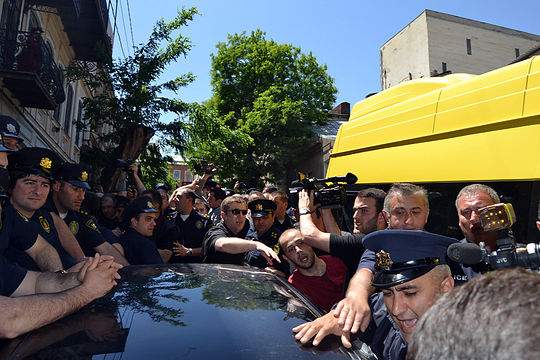
Anti-Gay Rampage in Tbilisi: Is Impunity Returning to Georgia?
Publication: Eurasia Daily Monitor Volume: 10 Issue: 96
By:

On May 17, several hundred gay rights activists from the organization Identoba (Identity) attempted to hold a rally in central Tbilisi to mark the International Day Against Homophobia (https://www.tabula.ge/ge/story/71188-17-maisis-aqcia-live-feed). Although the government deployed police to protect the demonstrators, thousands of anti-gay mobs led by radical clergy had little difficulty breaking through the fragile police cordons. They brutally attacked gay activists and their sympathizers and chased them down all across the city. Overall, 28 people, including three police officers and a journalist, suffered injuries (https://www.tabula.ge/ge/story/71249-17-maisis-aqcia-martlmadidebelma-aqtivistebma-dzaladobrivi-metodebit-chashales). Prime Minister Bidzina Ivanishvili was quick to denounce the violence, which resembled the one perpetrated against President Mikheil Saakashvili’s United National Movement (UNM) on February 8, when several opposition parliamentarians were violently attacked by hate groups (https://www.youtube.com/watch?v=MBNFdScDj4E).
But, in general, the rhetoric Ivanishvili has been using since his appearance in Georgian politics a year and half ago and the policy he has been pushing ahead with since assuming office in October 2012 are of little comfort to minority groups in Georgia. Unless his government takes decisive steps to curb in and punish violent groups, a sense of impunity will only grow, affecting Georgia’s political, economic and social stability. With political, religious, sexual and other minorities feeling increasingly insecure, Georgia’s isolation from the West will only deepen, inflicting dire consequences for a small nation on Europe’s periphery.
Radical clerics from the Orthodox Church not only inspired, abetted and led the mobs that ran amok on the streets of the Georgian capital, but some of them even actively participated in the rampage, shouting obscene words and threatening to kill homosexuals (https://www.youtube.com/watch?v=K6eakhFSvcc). Not surprisingly, the mobs were joined by Basil Mkalavishvili, a radical priest who spent several years in prison for attacking Jehovah’s Witnesses and was amnestied recently by the Ivanishvili government.
The powerful Bishop Iakobi (Jacob), who was one of the organizers of the anti-gay rally, is famous for his support for Ivanishvili and disdain for President Saakashvili and the UNM. As a major figure in the Georgian Orthodox Church, he frequently makes political statements condemning policies of the previous government and calling on Saakashvili and the UNM to “repent” and “ask for forgiveness” (https://www.tabula.ge/ge/tablog/71261-meufe-iakobi-cixeebshi-aupatiurebdnen-da-visze-amboben-dghes-rom-modzaladeebi-vart). Addressing the anti-gay crowd on May 17, he threatened the gay rights activists and the UNM (https://www.youtube.com/watch?feature=player_embedded&v=Z7NXvlYuqvE) and praised the anti-gay mob for its vigor in showing the “real identity” of Georgians (https://timer.ge/8055-episkoposi-iakobi-qarthvelma-erma-dghes-thavisi-identoba-daafiqsira.html).
Ethnicity and exclusiveness have been at the core of the radicalizing and increasingly isolationist Georgian Church whose almost only outside contact is the Moscow Patriarchate (see EDM, April 15). The same is true for the majority of the parties comprising Ivanishvili’s Georgian Dream (GD) coalition, with their long tradition of anti-Western and anti-NATO rhetoric and disregard for minorities.
According to the Tabula magazine, the Parliamentary majority leader, David Saganelidze, Ivanishvili’s close associate famous for his anti-Western stance and ethnic nationalism, explicitly blamed gay rights activists and the political opposition for “orchestrating a provocation” (https://www.tabula.ge/ge/story/71214-saganelidze-pasuxismgebloba-ekisreba-mat-vinc-arxeinad-isxdnen-avtobusebshi). Tina Khidasheli, a member of parliament (MP) and the wife of David Usupashvili, the pro-Western speaker of parliament, for her part, denounced the May 17 violence against sexual minorities, telling Rustavi 2 TV that all of the responsibility lay with the attacking mobs (https://www.rustavi2.com/news/video_progs.php?id_clip=5252&pr=Position&l=77&ftp1=1&ftp2=0&ftp3=0). Khidasheli, nonetheless, justified the decision of the Ministry of Internal Affairs to not use adequate force against the Orthodox radicals, but instead evacuate gay rights activists to a safe place. Human rights activists and the UNM expressed their dissatisfaction with the fact that the police failed to guarantee the right to free expression of the gay rights activists and to use adequate and proportionate force to bring the hate mobs under control. President Saakashvili said in his statement, “The government’s job is to not allow violence to occur in the first place” (https://president.gov.ge/ge/PressOffice/News/Releases/?p=8279)
Apparently in an appeal to Georgia’s Western partners rather than the domestic audience, Ivanishvili’s statement on the government’s official website first appeared in English and only hours later in Georgian. “The right to gather peacefully and to freely express one’s opinion is fundamental to our democracy,” the statement read. “Acts of violence, discrimination and restriction of the rights of others will not be tolerated, and any perpetrators of such acts will be dealt with according to the law” (https://www.government.gov.ge/index.php?lang_id=ENG&sec_id=270&info_id=36946)
Sexual minority issues have long become an integral part of Georgian politics. Highly praised in the West, Saakashvili’s government enacted policies to secure minority inclusiveness, arresting and charging those who infringed on sexual, religious and other minority rights. Dubbed as part of “the mental revolution” aimed at detaching Georgia from the post-Soviet space and making it a de-facto Western country, these and other modernization policies became subject of demonization at the hands of radical religious and political figures domestically. The president and his UNM party were frequently accused of “un-Georgianness” who tried to implant into the cultural fabric evils of the West, alien to traditional Georgian mores.
Footage from a prison showing acts of sexual violence against convicts, some of them apparently staged, played an important role in Ivanishvili’s victory in the October elections (https://civil.ge/eng/article.php?id=25255). While the large-scale haphazard amnesty that ensued the elections helped him to secure the support of dedicated vigilantes who targeted opposition parliamentarians on February 8 and most likely played their part in the May 17 violence. No doubt, the “restoration of justice” that has been a leitmotif of Ivanishvili’s domestic policy has found an appeal in the hearts and minds of amnestied criminals who owe their freedom to the billionaire prime minister and are traditionally associated with the xenophobic clergy in the Church. On several occasions, Ivanishvili has praised as “patriotic” a newspaper called Asaval-Dasavali with a distinctly homophobic and xenophobic editorial policy (https://netgazeti.ge/GE/105/opinion/13707/).
Up until the amnesty, Georgia had been one of the safest places in Europe, largely due to the previous government’s vigorous anti-crime policy. The country enjoyed almost 7-percent economic growth and an unprecedented 4 million foreign tourists and visitors in 2012. The parameters of economic growth already show steady decline this year, reaching its nadir in March with a mere 0.2 percent (https://www.geostat.ge/cms/site_images/_files/english/economic/monthly%20economic%20statistics_March.pdf).
Following the May 17 rampage, Western embassies in Tbilisi issued harsh statements condemning violence against the minority group, and the Dutch government even decided to summon the Georgian ambassador in The Hague “to convey its displeasure” (https://www.government.nl/news/2013/05/17/minister-shocked-by-anti-gay-demonstration-in-georgia.html).
If the Ivanishvili government cares about domestic calm and Georgia’s international reputation, it will try to arrest and bring to justice all perpetrators of the recent violence, be they laymen or clergy. If it decides to not do so, the cost might be political and social instability domestically and deepening isolation internationally.




